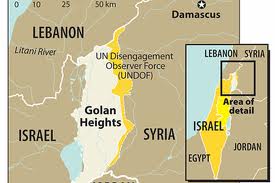Israel fired on Hezbollah militants who were attempting to plant a bomb on Syria’s border with the occupied Golan Heights, the Israeli army said Wednesday, as frictions with the Lebanese Shiite movement increase.
The Israeli army said it targeted “two Hezbollah-affiliated terrorists” on its cease-fire line with Syria. The Syrian state news agency SANA said four missiles and four rockets were fired onto its territory, followed by machine-gun fire, in violation of the cease-fire agreement.
The incident comes at a time of heightened tensions between Israel and Hezbollah. The Iran-backed group had vowed to retaliate after an alleged Israeli strike on one of its positions last week, Israel’s first attack on Hezbollah inside Lebanese territory since the 2006 Israel-Hezbollah war.
Hezbollah, which is estimated to have sent thousands of its fighters to Syria to back President Bashar al-Assad’s troops, may be attempting to revive support at home by provoking Israel, its traditional enemy, analysts say.
“Hezbollah is overstretched because of Syria, and it’s very important for them to convey that they aren’t overstretched and they can still fight their main enemy,” said Phillip Smyth, a researcher at the University of Maryland specializing in Shiite militant groups.
The group is under pressure as it digs into a new battle for the rebel-held Syrian border town of Yabroud, and there are unconfirmed reports that it has suffered heavy losses in the area.
A senior Israeli military official, who spoke on the condition of anonymity for security reasons, said Monday that Israel was facing a major security challenge at the border with Syria. Rocket fire and the planting of roadside explosives along the border fence have steadily increased over the past year, he said. “The border that was quiet for the last 40 years is now less quiet,” he said, noting that Israel has spent more than $57.3 million on a state-of-the-art border fence in the Golan Heights.
The official said the fighting in Syria has left control of the border divided between forces loyal to Assad and various rebel factions: The northern section is under the control of more secular rebel groups; the center is controlled by a mixture of Salafist and secular groups; the southern section is in the hands of more religious groups such as Jabhat al-Nusra; and Syrian regime forces control the areas with civilian populations, he said.
Placement of roadside bombs has not always been the work of Hezbollah, he said, but has typically been inspired by the Lebanese group.
“Hits were identified” after Wednesday’s strike, the Israeli army said. Lt. Libby Weiss, an army spokeswoman, said she could not confirm the status of those who had been shot on the other side of the border.
Hezbollah did not comment on the incident; SANA said that it was Hezbollah’s security forces who were hit, with seven of its personnel and four civilians wounded.
As Syria’s conflict continues to threaten the stability of its neighbors, atrocities continue within the country’s borders. The United Nations released a report Wednesday on human rights violations in Syria during the six months that ended Jan. 20, detailing war crimes perpetrated by both sides.
Nasrallah vowed to liberate Golan
Last May Hezbollah chief Sayyed Hassan Nasrallah vowed to help Syria liberate the occupied Golan Heights
“We announce that we stand by the popular resistance in the Golan Heights and we offer both our military, financial and moral support in an effort to liberate the occupied territory.” He said on May 10 , 2013 in a speech marking the 25th anniversary of Hezbollah’s Al Noor radio station.
He made the statement in response to Israeli attack on an alleged Hezbollah bound shipment of Syrian weapons.
He threatened Israel over the airstrikes near Damascus, suggesting that the Syrian government would retaliate by providing Hezbollah with more advanced weapons.
“The Syrian response to Israel was to insist that Syria will continue supplying the resistance with weapons. This is a critical strategic decision. Syria will give the resistance qualitative weapons, which the resistance has never received before.” He said .
He added :
“The second strategic response to Israeli airstrikes in Syria was to declare the beginning of a popular resistance campaign in the Golan Heights.
Washington Post/ Ya Libnan

Leave a Reply
You must be logged in to post a comment.